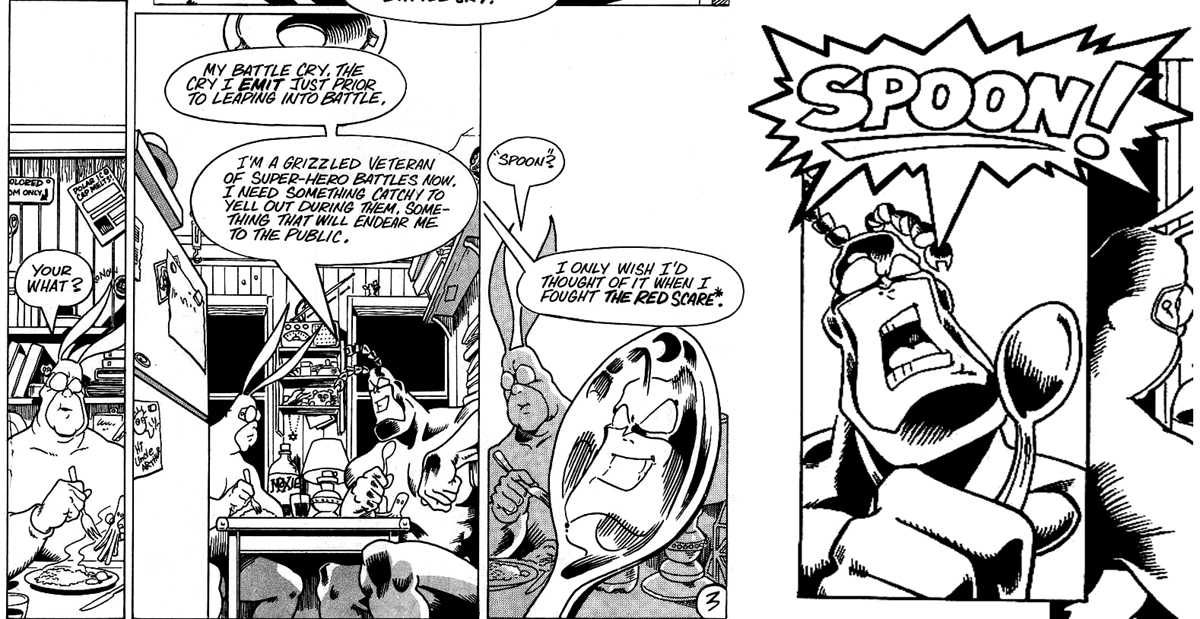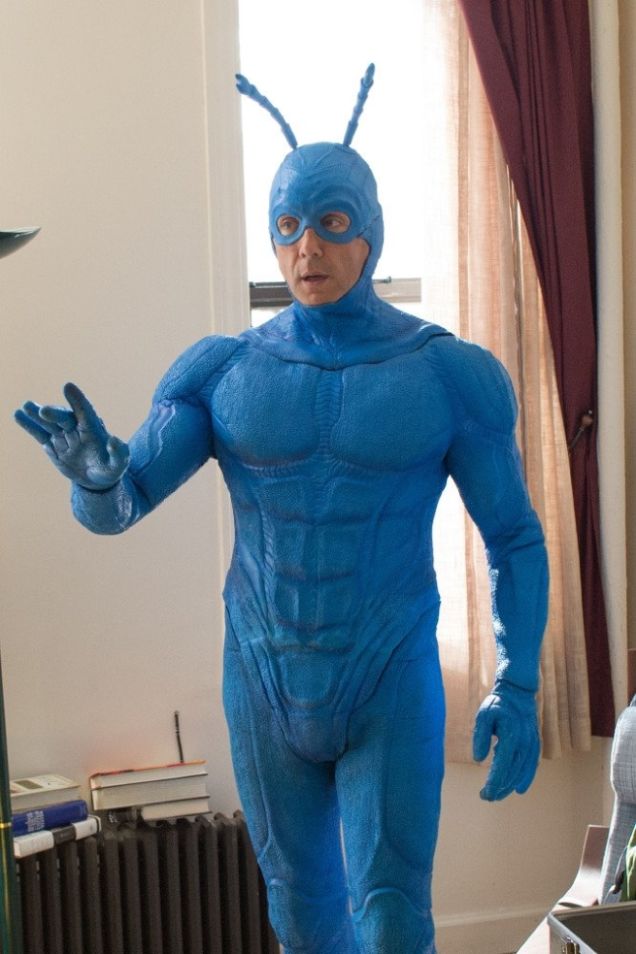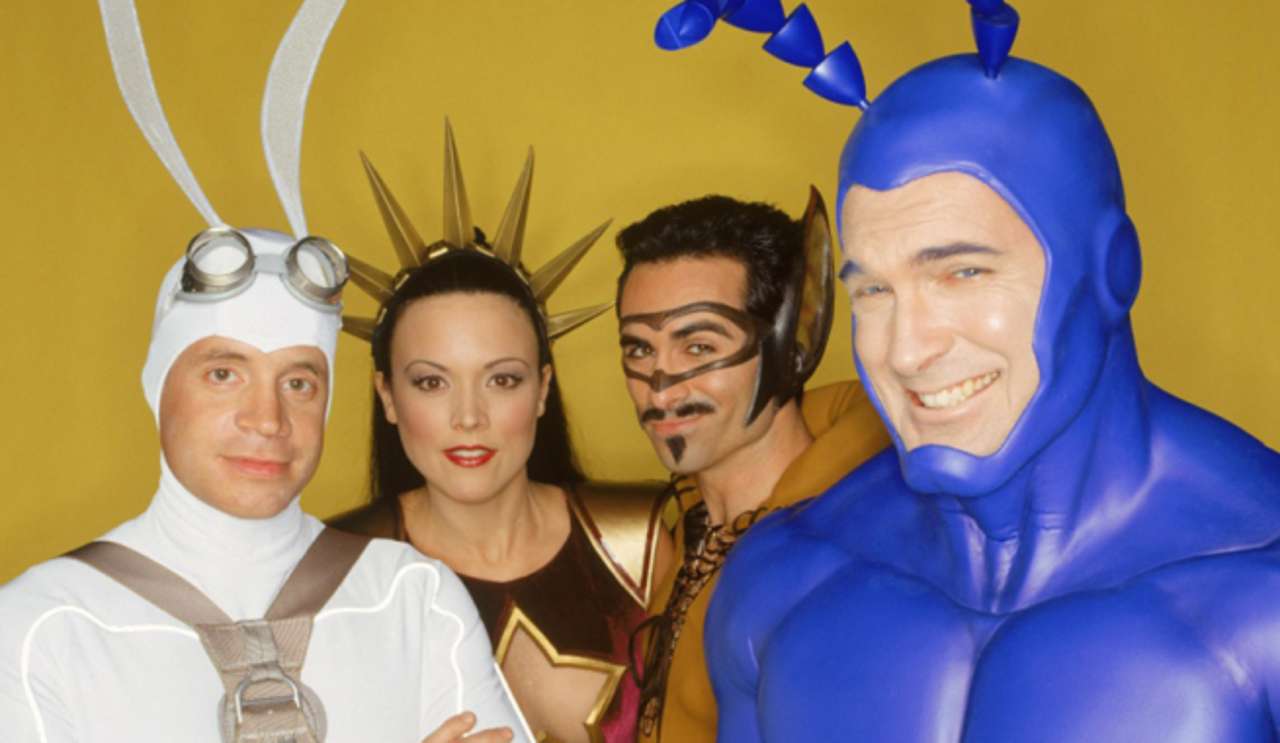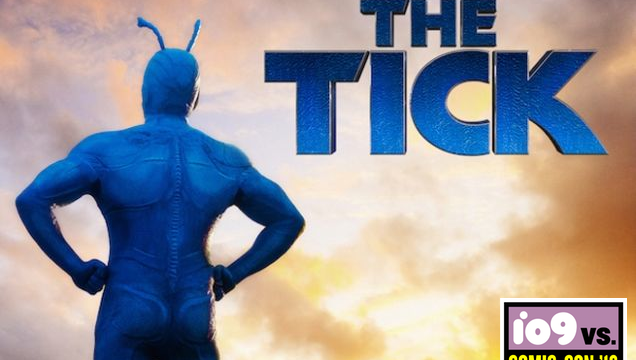Ben Edlund has a great laugh. Several of them, actually. One of them sounds like the sarcastic giggle of a skinny kid who used to insult his tormentors in ways that they wouldn’t even understand. There’s another kind of tittering that rings with nostalgia, as he thinks about elements from previous adaptations of The Tick. The laughter I heard the most was the excited cackle that came up when he discussed his new plans for his signature creation.
I spoke to Edlund last Saturday during Comic-Con 2016. We met in the nearly empty antechamber of the supposedly haunted Horton Grand Hotel, and it seemed apropos that a life-sized papier-mâché horse was only steps away from where we were talking. Despite being a long fan of Edlund’s big blue crusader, I had no idea what to expect when meeting him. After the humble indie-publisher beginnings of the Tick comic-book series, he’d gone on to write and produce for shows like Buffy The Vampire Slayer, The Venture Bros., Firefly, Gotham and Powers. Would he be all too-California-cool-for-school now?
Thankfully, that wasn’t the case. In the almost half-hour I spoke to him, I got glimpses of the adeptness that must make him an in-demand narrative architect. I could tell that he thinks through the conceits of his work on multiple levels, in both the real and fictional worlds. That’s what he’s doing on the new Tick series set to debut on Amazon Video in a few weeks (an Australian release has not yet been announced), and any worries I had have been replaced by a deep curiosity.
The funny thing about The Tick is that it was a throwaway character, a parody of something like Daredevil, some of the other tropes that were going on in superhero comics at the time. How do you feel about it having this weird kind of longevity?
Ben Edlund: Grateful. And probably surprised if I give it time to think about it. It’s sort of the experience of being in the forest for the trees; this has been so much just a gradual expression of cultural reception. A lot more words than we needed, there… but, at this point, it has been 30 years where someone has been talking to me about this creation and people have been responding out there to this thing. I don’t think I had much of a plan at that time although I did want it to succeed. I wanted it to become a thing.
My model of what success was at that point was Teenage Mutant Ninja Turtles. It was what I had seen come before it. The Tick never accomplished what the Teenage Mutant Ninja Turtles did. It ran its own path, which is kind of like this weird Rocky Horror Picture Show sort of thing.
Right. It’s become a cult favourite.
Edlund: Yeah.
But maybe not like super underground or obscure, but at the same time, it’s not like you said, Teenage Mutant Ninja Turtles, where I can hum the theme song.
[Edlund laughs.]
I can hum the Tick theme song from the cartoon too but I won’t. But as you were saying, you’ve gone through at least three different instances where it’s like, “OK, it’s being adapted. It’s going to hit a larger audience.” Then it stops. Then, OK, somebody else is expressing interest. Were you at all hesitant to get back on the merry-go-round this time?
Edlund: Yes, for sure. The previous live-action [adaptation] was really physically and emotionally difficult because of the budgeting and it was just very ambitious. We were never on top of our own system of getting it done. So it was all overtime. All 20-hour days. Just really gruelling. That had an effect. It made me trepidatious from the perspective of what it would take, number one.
Each time one goes back and looks at this again to try and do it, you are messing with what already works, culturally. I think that with the superheroes, it would be almost like not doing your sit-ups to not have a reinvention every 10 years.
It’s not something where like I feel I’ve gone back to the well too many times. It’s just that I don’t want to personally put my energy into something that isn’t worth doing. Any new version of it has to have a new reason for being. That’s why it took as long as it did. Also, it took a long time for Amazon, Sony and myself to all really understand that we were all saying the same thing, which is that we just want it to be really good. That has been the early and persistent mantra of all the people involved with this. Those were the terms under which I wanted to come back.
The Tick never had any kind of lore around it, but the basic set-up in the description for the Amazon show is much different than the previous versions:
In a world where superheroes have been real for decades, an underdog accountant with zero powers comes to realise his city is owned by a global super villain long-thought dead. As he struggles to uncover this conspiracy, he falls in league with a strange blue superhero.
It centres much more on Arthur. Arthur has always been central, but it seems like this is more about him as a character in his own right and not a sidekick. Can you talk about the changes in the approach in how you’re framing the story this time?
Edlund: Yeah. It was very much that. Up to this point, Arthur’s been what is called “the window-in” character.

Yeah. A viewpoint character.
Edlund: Yeah, and ultimately that’s worked great for the cartoon and worked well for the live-action in terms of what we were looking for as an expression of The Tick at the time. Now Arthur is a legitimate main character protagonist, where he’s not just your excuse to have fun with the world. That is very much a lot of characters in a lot of genre expressions and it’s totally real and good. This is more like Arthur has his own story and you need to see it play out. You care about where he came from and where he’s going. The Tick is, in essence, the weirdest thing that’s ever happened to Arthur. And that’s the story.
It seems like from that set-up that The Tick is going to be more of an inscrutable force of nature rather than like, “Yeah, we get to know him and we know that he’s weird.” It seems like we might get to know him a little bit less?
Edlund: There will be a part of him, like a black box in there, where you’re like, “I don’t know, things go in and then things come out. But I don’t know the middle part.” That, to me, is more of an expression of definitely the comic book and in some ways the cartoon. There was a point in the cartoon where The Tick jumps off of a roof with Arthur. He doesn’t give him time to put on his wings. “There’s no time!” Then he lands. Arthur is not sure if his back is broken or not. The Tick is like, “Wiggle your toes, chum!” And it works.
He goes, “OK, let’s go!” Like he just doesn’t care. [laughs] Like, “Good! Let’s go.” The Tick is a parasite. Right? He meets Arthur and lives in his apartment. He doesn’t even ever ask. Arthur’s world is utterly taken over. All of his agendas are claimed by this thing, as if he caught some bug in the jungle that has totally reinvented his digestion. That’s the kind of shit that’s going on with this thing. That’s how Peter plays it. There’s sort of a creepy pansexual depth [laughs] to the way that Peter is doing it. He’s just… he’s interesting. He’s a comedic fountain of brilliance.
It seems that in previous iterations you are talking about the way that The Tick upends Arthur’s world. Arthur embraces that. I remember specifically in the comic where he’s like, “Finally, this is my destiny. I’m supposed to be a superhero and this is the mechanism by which it happens.” There’s a bit of that in the cartoon too. But, even there, I remember a few times he was bitching at The Tick, like, “You’re screwing up my life.” But this time we’re at the other end of the spectrum entirely.
Edlund: I’d say it will be the same dance: Arthur will realise that he desperately needs The Tick, given the plight he’s gotten into. Now, I think in better structural form this time around, The Tick is very involved in deepening Arthur’s problem. He meets The Tick and he’s never going back to anything approaching normalcy. The thugs hate him now. The gangs know who he is. All of it is bad. In fact, Arthur would have never even conceived of being a superhero. He just wanted to try to expose evil in his town. But The Tick comes on as a whole package and practically wraps him in a superhero identity that he will not let him get out of. So that’s the right dynamic. Then, with Arthur, it’s up to him to realise, “OK, my new friend is either my murderer or my emancipator and, moment to moment, I’ve got to figure out which.” [laughs]
Let’s talk about casting. I’ll never forget when I heard Patrick Warburton was going to be The Tick in the last version. I was like, “Oh my God. It’s utterly perfect.” I think there’s a lot of affection for what he did in the short time he was able to do it. When they were talking about mounting it back up, the idea was that he was going to return. But Serafinowicz is a dyed-in-the-wool nerd. He loves his comic books and video games. There’s different physicality. There’s different quirks and nuances. How did the differences in casting affect your approach to the character?

Edlund: It’s everything. It is the new expression of The Tick. To me, Patrick was perfect for what we were doing there. I love Patrick. Everything since I worked with Patrick, I write a role for Patrick, even if he’s available or not. Half of the things I haven’t done have him in the lead. I’ve got a secret agent thing where he should be the lead.
He’s also a high school band teacher in another thing that I’ve got that only he will play his own compositions. He only lets the band play his compositions. [laughs] Because he’s so great. Ultimately, what we came to find as we were doing this, it had to be a brand new expression. Everything was different. The way Arthur functions, the way The Tick functions, the way the world functions, the way we envision it, the way the humour functions. It’s different, in terms of less puns. The things that work in a cartoon or in a heightened universe, you cannot use in the same way. The puns have to be different. Sometimes they have to be structural, which means it’s rhyming action versus things that are more subtle but are built in. Here’s the thing about the prior live-action, which I think as a piece, works. As much as we would have done other things with it, it did not need much more of itself to get what it needed to get it across.
My goal is to make 50 of these episodes that make up a continuous story that can be binge-watched. That at the end of it, you go, “Oh, I just watched a five book series called The Tick. It’s told me about the whole world of it, about why it started and why it ended and why we began the story.” Not just a free jazz improvisation that goes for as many seasons that you’ve got funding.
You have an explicit structure in mind from the outset.
Edlund: Yes.
But at the same time you have to build it modularly, right?
Edlund: Yes.
Because if you only get two, if you only get one, you want people to feel like they got a full dose.
Edlund: Yes. There’s two layers too. If we only got two or one, the price of attendance would be less so I could develop less of the larger themes. Then, for the purposes of 20 episodes, you could have a meal that worked. But the underlying structure is built and encoded for roughly four- to five-season run where you’re trying to figure out who the hell The Tick is and why he’s here at all and what Arthur’s ultimate destiny is and what it’s got to do with the world’s largest superhero.
So you’re caught up in a large story that’s got a lot of mystery and very weird stuff that is millions of years old like my continuity, which is crazy. I went to work with Joss Whedon and Eric Kripke and then all of these people and got increasingly continuity-obsessed. It’s crazy that they have allowed the amount of continuity that I want to put into this.
The words ‘continuity’ and ‘The Tick’ don’t even go together [Edlund laughs loudly]. I’ve always read them as jokey standalones or meta-textual riffs on superhero genre pillars. That’s great. You can improvise off of that. For you to tell me, “No, there’s an actual theme here…”
Edlund: It’s a radical shift. It does a couple of things. One thing it takes us from being only the joker at the corner and puts us into the same pool [as other superhero adaptations]. And it makes the job of making fun of it more challenging because we’ve got skin in that game.
Right. You’ve got to walk the tightrope.
Edlund: In a sense. Whereas before, in the live action we shirked action because we weren’t obligated to do all of it. With this, our scope and our effects, and what little action we can show, that’s designed to be competitive. It’s funnier. Before, if you remember, the biggest fight we ever had was a camera shot on Arthur, and [people getting thrown across the frame], and it was not a fight. [laughs] That’s not the route. We are trying to wear the skin of the beast.
Going whole hog, all in.
Edlund: Yes. We did that effortlessly in the cartoon. We were always full skin-in-the-game. Like, if you want to have an aerial chase and Godzilla and then this and that. So to capture it again, I don’t think there’s any version that you would watch for more than 10 episodes that doesn’t have an invested story that you care about. You can’t make that many jokes matter. It’s not Mad Magazine. You don’t get to just get a new subject. It’s the same subject with new jokes. I couldn’t conceive of any other way to do this.

That’s fascinating. That leads to something else that I wanted to ask you. Which is, we’re in a moment now, where all of the stuff when you started as a fan and a professional is extrapolated to the point where it’s the oxygen now. You have a character that you created to make fun of Daredevil, and now Daredevil is on Netflix.
Edlund: I know. It’s the perfect timing. It’s crazy.
How do you react to all of this stuff that used to be ‘mother’s basement nerd jokes’ now being part and parcel of mainstream centre-row conversations? How do you react to that? Part of it is my own disposition I’m talking about. One of the problems I have with Zack Snyder and the stuff he’s executing for DC, I feel there’s a lot of nerd self-loathing in there.
Edlund: Not being licensed to have fun.
You can’t have fun. And the feeling is like you’re still kind of embarrassed that you like Superman. Like, “Oh, he can’t have the underwear on the outside anymore.” I’m like, “This is what it is.” And the thing that you think is so important — no briefs on the supersuits — about making it mainstream is actually not. I’m riffing. But I want to hear about what you have to say about the nerd moment that we’re in and bring The Tick into and owning the nerdiness of it all.
Edlund: I think part of this approach is exactly that, owning the nerdiness. There would never have been a time where I would have had licence to try to do this. I don’t know of another tone than the one we’re generating in the new show.
Yeah, the description in the log line make me wonder, “Is this going to go dark?” I have faith in you but…
Edlund: I know exactly your fear and it’s connected to [Man of Steel]. Like it’s that same thing. Superman with the dragons and the crazy Game of Thrones planet and all of this stuff. Then the whole battle in Superman is just for him to minimise collateral damage. He doesn’t save people. He just tries to minimise collateral damage. At the core what the thinking is in terms of what that is, it’s not a superhero.
Maybe I’m just an old dude who remembers Christopher Reeve saving kittens but it’s super weird to see people defending this interpretation. I mean it’s not weird, people will defend anything, right? But, for me, there wasn’t enough of saving lives.
Edlund: No. There was almost none of it. We’re saturated with superheroes. We do not know what a superhero means right now culturally. It used to be something like a legitimate wish-fulfilment fantasy. An escapist desire to gain power over uncontrollable events. That has now gone. Because now it is this carpet of ideation that has just rolled over us. It is the sky. So it’s filled with superheroes.
Without being examined.
Edlund: Without being examined. At the core of what a superhero is now, to me, has shifted in a way. These are godlike powers that no longer are you saying, “What would I do in that position?” You are just looking at these godlike creations.
It has gone from being wish fulfilment to assignment of accountability. So, “I don’t know how we got into Iraq? [laughs] But it wasn’t me.” Do you know what I mean? “It was great giant forces over my head with tanks or capes. So I don’t know, but I want to see Captain America and I want Captain America to not want to be a bully.
So I’ve got Iraq and then I’ve got this image of America expressed through a superhero called Captain America, who says in his movie, “I don’t like bullies.” You’re Captain America. You might not like bullies but who made your shield? That’s a good shield. Where did you get it? [laughs]
So I want to use this to examine all of that. Because Arthur is just a guy who desperately wants the world to be better. He has no sense of personal power. He cannot turn away from what he thinks is a thing that’s dangerous that needs to be addressed. He is a hero. He’s heroic.
It starts before he puts a mask on. It’s about his interior landscape.
Edlund: Yes. He has no choice. And when The Tick comes, he doesn’t even know he’s a hero. The Tick is just, “You’re a hero! You’re my hero. Let’s go! If you die along the way, that’s OK. [laughs] Because you’ll die a hero.” He’s like, “What?” “It’s good! Let’s go!” They are underdogs. Most heroes are. But they are underdogs. Their universe doesn’t even allow them to be cool.
Right, because other heroes are extant already.
Edlund: Oh yeah. Like, “I got their number and their number is jackass.” [laughs]
Let’s talk about villains in the new Tick show. You’ve got an over-arching big bad here. How much mystery is there around him?
Edlund: He is known to be dead. This is The Terror from the comic book and from live action, played [then] by our friend Armin Shimerman. The Ferengi from Star Trek! Yes. He is like our Magneto or our Lex Luthor or our Doctor Doom. He has no evident powers of his own. He’s the ultimate criminal mastermind. He has that weird magical planning ability of the Heath Ledger Joker. Or Javier Bardem’s Raoul Silva from Spectre, with the ability to just make a subway come crashing out. He’s at that level of planning. [laughs] That’s the level of planning he’s capable of, magical planning.
What’s fun is that he’s a monster from the past. He interacted with Arthur as a boy and he’s a monstrous figure in Arthur’s memory. But I think when he comes back he will be somewhat unexpected. I don’t know what it is. Maybe he’s been on some self-improvement jab. We don’t know. So there will be fun to be had. Jackie Earle Haley plays The Terror [this time] and he’s awesome. He is great.
It feels to me that so many people who were working creatively in, like, nerdspace are not engaging with it anymore. And what’s really surprising to me in talking to you is it seems like you are. You’ve seen [Man of Steel]. You seem to be up on your shit. I figured when you went on to Buffy and all your television work, you’d be done. It was like, “Oh he’s going to be up and out in the world. He’s waving goodbye.” I was like, “That’s OK. I wish him well.”
Edlund: [laughs] See you guys. I’m ascending to Heaven.
You seem like you’re engaging with comics and superhero stuff. You still have the love.
Edlund: Yeah. I’ve never wanted to not be in genre. It’s what I love. I don’t know everything. There’s too much to track now. I’ve seen pretty much a sampling of most everything out there but I can’t follow all of it, continuity-wise. But, yeah, I care. [laughs]
